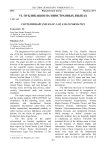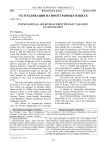Вестник Пермского университета. Юридические науки @jurvestnik-psu
Статьи журнала - Вестник Пермского университета. Юридические науки
Все статьи: 1143
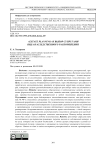
"Estate planning" и выбор супругами вида наследственного распоряжения
Другой
Введение: анализируются виды посмертных наследственных распоряжений, предоставленных супругам по нормам российского законодательства. Введение новых видов распоряжений - совместного завещания и наследственного договора - делает актуальной задачу по их исследованию, сопоставлению с традиционным, «классическим», завещанием и выявлению наиболее эффективного способа наследственного планирования. Цель: на основе анализа доктринальных источников, норм действующего российского и зарубежного законодательства, практики их применения определить основные критерии, которыми следует руководствоваться супругам при выборе вида наследственного распоряжения. Методы: применялись общенаучные и частнонаучные методы исследования: формальной и диалектической логики, методы описания, сравнения, интерпретации, юридико-догматический, исторический и метод толкования правовых норм. Результаты: анализ норм действующего законодательства показал, что ряд положений ГК РФ о совместных завещаниях и о наследственных договорах нуждаются в более детальной проработке и разъяснении. Все установленные законом виды посмертных наследственных распоряжений направлены на реализацию гражданами права наследования и гарантированы к исполнению нормами действующего законодательства. Однако гарантировать беспрепятственное осуществление права наследования, с одной стороны, и обеспечить взаимосвязанность волеизъявлений в совместном завещании или наследственном договоре, с другой стороны, оказалось невозможным. Потому выбор законодателем был сделан в пользу свободы волеизъявления. Выводы: при выборе супругами вида наследственного распоряжения решающее значение имеют их собственный интерес и те цели, которых они желают достигнуть. С точки зрения содержания и условий наследственный договор в сравнении с завещанием и совместным завещанием более разнообразен. Однако ни один из видов посмертных распоряжений не может гарантировать получение наследником обозначенного в завещании, в том числе в совместном завещании или наследственном договоре, имущества. Более предпочтительными в такой ситуации оказываются прижизненные способы распоряжения имуществом.
Бесплатно
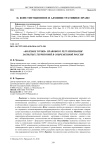
"Болевые точки" правового регулирования закрытых территорий в современной России
Статья научная
Введение: в статье раскрываются особенности функционирования закрытых административно-территориальных образований (ЗАТО) через призму трех блоков правоотношений, связанных: с ограничением конституционных прав и свобод граждан, с особенностями социально-экономического развития ЗАТО; с охраной государственной и общественной безопасности. Цель: выявить проблемы правового обеспечения режима закрытых административно-территориальных образований и определить направления дальнейшего развития территорий действия этого режима. Методы: всеобщие методы познания: системный, диалектический; общенаучные подходы: генетический, структурно-функциональный, методы - индукция и дедукция, приемы - анализ и синтез, абстрагирование, восхождения от абстрактного к конкретному и др.; а также специальный метод - формально-юридический. Результаты: выявлены основные подходы к содержанию понятия ЗАТО; обозначены цели административно-правового режима ЗАТО; установлены особенности режима ЗАТО, связанные с ограничениями конституционных прав и свобод человека и гражданина; показаны перспективы социально-экономического развития ЗАТО; раскрыты проблемы привлечения к ответственности нарушителей режима ЗАТО. Выводы: для преодоления нечеткости в правовой ре гламентации административно-правового режима ЗАТО требуются: унификация подходов к содержанию режима ЗАТО; использование инновационных возможностей социально-экономического развития закрытых территорий (реализация кластерных стратегий, привлечение частного бизнеса и пр.); нормативная фиксация на федеральном уровне всех категорий граждан, имеющих право на въезд на территорию ЗАТО; определение природы мер принуждения, устанавливаемых в муниципальных актах и применяемых к нарушителю режима ЗАТО, и соотношение их с мерами административной ответственности, установленными в Кодексе Российской Федерации об административных правонарушениях.
Бесплатно
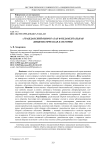
"Гражданский оборот" как фундаментальная цивилистическая категория
Статья научная
Введение: одной из актуальных задач отечественной цивилистической науки является формирование современного подхода к пониманию фундаментальных цивилистических категорий, к числу которых следует отнести и «гражданский оборот». Цель: разработ-ка авторского подхода к категории «гражданский оборот», включающего семантиче-ское значение категории «оборот», обзор доктринальных подходов к пониманию терми-на «гражданский оборот», определение нормативного значения термина «гражданский оборот», объектно-субъектного состава гражданского оборота, установление его со-держания. Методы: использовались общенаучный диалектический, универсальные науч-ные методы (анализ и синтез, индукция и дедукция, сравнение, абстрагирование, кон-кретно-исторический, структурно-функциональный, формально-логический, системно-структурный), специально-юридические методы (сравнительно-правовой, метод си-стемного толкования). Результаты: гражданский оборот выделяется из имуществен-ного оборота благодаря тем принципам, которые лежат в основе функционирования гражданских правоотношений, - диспозитивности, равноправия, автономии воли, неприкосновенности собственности и иных частноправовых начал. При этом с точки зрения юридической сущности гражданский оборот, в отличие от имущественного обо-рота, представляет собой оборот субъективных гражданских прав на объекты, а не оборот собственно объектов. Выводы: с позиции догматического подхода термин «гражданский оборот» может употребляться, главным образом, в двух смыслах - уз-ком и широком. В узком смысле под гражданским оборотом следует понимать совокуп-ность случаев смены носителей субъективных гражданских прав; в широком смысле данный термин включает в себя и иные волевые акты распорядительного характера.
Бесплатно
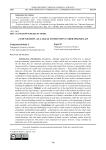
A foundation as a legal institution under Polish law
Статья научная
Introduction: the article deals with policy in the field of mental well-being of children and adolescents in Poland. Special attention is paid to the country's educational law and the tasks that face the entities constituting the Polish educational system in terms of taking effective measures to protect mental health of children and adolescents, including health promotion, prevention of mental disorders and the provision of care for people with mental aberration. Purpose: the article aims to identify and discuss some aspects of policy on mental well-being of children and adolescents in Poland. Methods: the complex and interdisciplinary nature of the issue in question determined the methodological framework of the study. The authors employ methods traditionally used in research on public policies, such as political analyses of processes, methods used by researchers in the field of law, administration and economics. The main research tool in this study is the analysis of political public contexts which occur in the administration and enforcement of law. A functional system analysis is employed as an auxiliary tool. Results: despite the fact that the discussion on maintaining the mental well-being of children and adolescents has been taking place for many years, and that the educational law system and health policy, including its elements related to mental health, cover many aspects being of fundamental significance to the issue in question, practice shows that that there are still systemic and institutional deficiencies in this field. Conclusions: mental health promotion and mental disorder prevention in children and adolescents cannot be treated as separate activities, but they require a holistic, systemic, and hence horizontal approach. These activities must be integrated into a unified prevention policy at all decisionmaking and operational (executive)levels.
Бесплатно

Статья научная
Введение: рассматриваются институционально-правовые основы взаимодействия России и неарктических государств в Арктике в новых геополитических реалиях. В связи с изменением характера взаимодействия арктических государств в рамках Арктического совета, Совета Баренцева/Евроарктического региона представляется обоснованной разработка новой институциональной архитектуры взаимодействия государств в полярном регионе.
Бесплатно
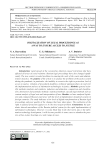
Digitalization of legal proceedings as a way to ensure access to justice
Статья научная
Introduction: rapid spread of the coronavirus infection caused restrictions that have affected all areas of social relations. Russian legal proceedings have also changed significantly. The new context revealed problems in ensuring the work of the courts and administration of justice. The purpose of the article is to analyze the problems of the justice system during the pandemic, in particular, the inability to exercise the right to protection, lack of access to justice, violation of procedural deadlines, technical unpreparedness of courts for the implementation and use of information technologies in justice. Methods: general scientific methods (analysis and synthesis, induction and deduction, comparison and classification, abstraction and axiomatic method); statistical methods; special legal methods such as content analysis of legal acts and interpretation of laws. Results: we have analyzed legislation and compared Russian experience with the level of digitalization of judicial systems in foreign countries. The study indicates a low level of digital transformation of Russian legal proceedings and poor quality of the changes that have taken place. The realization of the right to judicial protection appears to be the most urgent problem. Conclusions: the pandemic showed unreadiness of the Russian judicial system for the rapid implementation of information technologies. However, it seems likely that in the short term, due to the information technology development, it will become possible in some cases to abandon the practice of face-to-face hearings on a wide range of cases.
Бесплатно
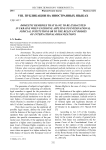
Статья научная
The purpose of the article is to identify domestic remedies that have to be exhausted in Ukraine when everyone applying to international judicial institutions or to the relevant bodies of international organizations. The above analysis allows to reach such conclusions: the legislation of Ukraine provides a single cassation and review of the judgment. The law may provide for other forms of appeal and review of decisions of courts of general jurisdiction; domestic remedies that have to be exhausted in Ukraine when everyone applying to international judicial institutions or to the relevant bodies of international organizations are high specialized courts as courts of cassation for civil and criminal, commercial and administrative matters. High specialized courts are the High Specialized Court of Ukraine for Civil and Criminal Cases, the Supreme Economic Court of Ukraine, the Supreme Administrative Court of Ukraine.
Бесплатно
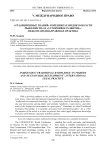
Статья научная
With a growing emphasis to the problem of sustainable development and indigenous issues, states and international organizations pay attention to indigenous peoples' 'traditional environmental knowledge' as a particular form of knowledge of the diversity and interactions among plants and animals, landforms, watercourses, and other traits of the biophysical environment in a given place. Sometimes its called Traditional Ecological Knowledge, it is typically associated with aboriginal peoples [6, p. 198]. The purpose of the article is to show in practice how states apply indigenous knowledge to protect environment, especially in fishery activity.
Бесплатно
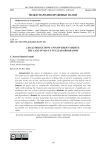
Legal obligations and sovereign rights: the case of Iran's nuclear programme
Статья научная
Introduction: the nature of obligations varies in terms of compliance and liability. This point can be aptly illustrated in the case of Iran’s nuclear programme since Iran opted not to cooperate in presenting guarantees verifying that its nuclear programme would be peaceful. In the case of Iran’s nuclear programme, each significant actor has had its own instrument to deal with the problem of verifying the peaceful nature of Iran’s nuclear activities. Purpose: the paper aims to examine the relationship between legal obligations and state rights while studying the relations and cooperation between legal actors of significance contributing to the case of Iran’s nuclear programme. Methods: the author employed descriptive and qualitative analyses to study the content of legal documents and discover the correlations and dependencies. Results: the research has established that the assessments and resolutions on the case of Iran’s nuclear programme have been based on probability and assumptions, not on concrete evidence. The legal actors have failed to achieve a full balance between the rights and obligations. Conclusion: there is a need for new multilateral agreements to introduce legal obligations and commitments compatible with present circumstances and predictably flexible for monitoring of the developing situation while preserving Iran’s sovereign rights.
Бесплатно

Legislation related to school shootings in Great Britain
Статья научная
Introduction: school shootings remain a highly relevant topic for investigation because the social environment and interpersonal relationships play a leading role in the formation of aggressive intentions of perpetrators. The purpose of this study is to provide an overview of British legislation related to school shootings. Historically, the law of homicide in the United Kingdom has had a number of distinguishing marks. Structurally, the Scots law of homicide resembles the law of England and Wales because the offences of murder and culpable homicide in Scotland closely resemble the offences of murder and manslaughter in England and Wales.
Бесплатно

Ownerlessness of things: de jure vs. de facto
Статья научная
Introduction: the article presents critical analysis of the concept "ownerless thing", which is of topical interest due to the controversial nature of some theoretical aspects of the subject as well as due to the general social significance of the problem of ownerless things at present. Purpose: based on the analysis of legal and doctrinal provisions and case materials, to develop a concept of ownerless things which would conform with other provisions of the current legislation and would make it possible to solve problems arising in connection with determining the future of ownerless things in practice. Methods: formal-logical, historical, comparative, dogmatic; some of the inferences are based on the functional approach. Results: the legal definition included in the rule of Cl. 1 Art. 225 of the Civil Code of the Russian Federation and connecting ownerlessness of a thing solely with the question of the right of ownership to it fails to correspond with some other rules and regulations (in particular, par. 2 Art. 236 of the Civil Code of the Russian Federation) and fails to comply with the needs of modern society, as it only assumes the statement of the legal ownerlessness of a certain thing, with vagueness in questions of its keeping, maintaining, repairing and legal responsibility in case of its harmful impact. Conclusions: ownerlessness of a thing ought to be understood as de facto state of this thing, without regard to the right of ownership to it, under which condition, the thing is in possession of nobody and (or) it has no claim from a certain person. Therefore, a thing which has its owner cannot be considered an ownerless one. Moreover, such understanding corresponds with the intended legislative consolidation of the provisions on possession as de facto and its defense in the Civil Code of the Russian Federation.
Бесплатно
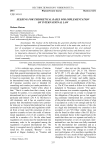
Seeking for theoretical bases for implementation of international law
Статья научная
The Analyze of the following key questions dealing with theoretical bases for implementation of international law in this article is the main aim, such as: effect of acceptance or non-acceptance of priority of international law over national laws; realm of international law; difference between global society and domestic society; imperative character of the international law; imperative basis of international law; existence of international supervising system; independent legal personality of international community.
Бесплатно

Social component of autonomization in Europe: legal aspects
Статья научная
Introduction: the article is devoted to the autonomization process (gaining of ethnical and territorial autonomy) in modern Europe and relevance of the social component in this process. Purpose: to analyze the significance of the social component, considered under this study as vesting autonomies with power to carry out social policy and providing them with the relevant financial opportunities in the course of decentralization and devolution. Methods: the methodological framework of the research is based on a set of methods, including universal, general scientific methods and also comparative law and technical methods. Results: various models of autonomization in Europe show various strategies of regional and/or ethnical elites. The models considered in the article are characterized with the elites' focus on gaining a high degree of autonomy and its legitimation (decentralization without breakup of the state, devolution without revolution). Though political ambitions, ethnical and regional identity play their significant part, socio-economic factors, in general, and the autonomization social component, in particular, determine this process to a considerable extent. The European models of autonomization do not exemplify political ambitions being satisfied at the expense of social policy curtailing.
Бесплатно

Другой
Introduction: the article deals with policy in the field of mental well-being of children and adolescents in Poland. Special attention is paid to the country’s educational law and the tasks that face the entities constituting the Polish educational system in terms of taking effective measures to protect mental health of children and adolescents, including health promotion, prevention of mental disorders and the provision of care for people with mental aberration. Purpose: the article aims to identify and discuss some aspects of policy on mental well-being of children and adolescents in Poland. Methods: the complex and interdisciplinary nature of the issue in question determined the methodological framework of the study. The authors employ methods traditionally used in research on public policies, such as political analyses of processes, methods used by researchers in the field of law, administration and economics. The main research tool in this study is the analysis of political public contexts which occur in the administration and enforcement of law. A functional system analysis is employed as an auxiliary tool. Results: despite the fact that the discussion on maintaining the mental well-being of children and adolescents has been taking place for many years, and that the educational law system and health policy, including its elements related to mental health, cover many aspects being of fundamental significance to the issue in question, practice shows that that there are still systemic and institutional deficiencies in this field. Conclusions: mental health promotion and mental disorder prevention in children and adolescents cannot be treated as separate activities, but they require a holistic, systemic, and hence horizontal approach. These activities must be integrated into a unified prevention policy at all decision-making and operational (executive) levels.
Бесплатно

The principle of freedom of contract in civil law of the Republic of Belarus
Статья научная
Introduction: according to the author of the article, the principle of freedom of contract, secured among fundamental principles of civil legislation of the Republic of Belarus, is not fully implemented in the current legislation. Purpose: to identify legal rules incoherent with the requirements of the principle of freedom of contract and to work out proposals for their correction. Methods: the methodological framework of the research is based on a set of universal, general scientific and specific scientific methods of cognition. For the purposes of this research, the leading role is assigned to analytical, critical and systemic methods, methods of analysis and synthesis, abstraction and concretization. Results: the author proves that the principle of freedom of contract is not confined within the scope of law of obligation. Being a fundamental principle of civil legislation, it extends to its whole array, its manifestations being found in all branches of civil law. One should not limit the principle of freedom of contract to the freedom of entering into a contract only because freedom of contract manifests itself at all stages of contractual relations until termination thereof. So far as the principle offreedom of contract is a base for civil law regulation in relation to rules of contract law, including the regulation on freedom of contract, the author suggests distinguishing between restriction of freedom of contract as a principle and restriction of certain elements of freedom of contracting parties. Conclusion: freedom of contract, as any freedom, should obtain guarantees. That is why it is essential for its limits to be set under the law only providing private and public interests are balanced.
Бесплатно
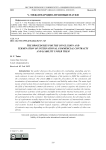
Статья научная
Introduction: the author discusses the procedures for concluding, amending, and terminating international commercial contracts, and also the responsibility of the parties to such contracts in case of evasion or unwillingness of the parties to fulfill the conditions of the concluded contracts. The article aims to study the procedures for the conclusion and termination of international commercial contracts and liability under them. The main legal means of interaction between participants in the commercial turnover is a civil contract. In the field of international commercial turnover, a civil contract acquires the features of an international commercial contract. International commercial contracts mediate the international business activities of the parties and differ from similar internal transactions, as well as from transactions that, although complicated by a foreign element, are concluded with the participation of the consumer. International commercial practice has developed a number of requirements usually imposed on the content and structure of international commercial contracts. It is concluded that international commercial contracts usually contain several sections located in a certain logical sequence, although the content and structure of contracts may vary depending on the specifics of the product and a number of other conditions.
Бесплатно

The right perception of the concept of right: a view through the prism of obligations
Статья научная
Introduction: the concept of right, which is one of the fundamental concepts of legal science, cannot exist as an independent concept. It is sine qua non dependent on the concept of legal obligation that gives the former its existence and meaning. This is similar to the relationship between the concepts of stove and fire: even though fire can exist and have a meaning without a stove, neither the existence nor the meaning of a stove is possible without fire.
Бесплатно

